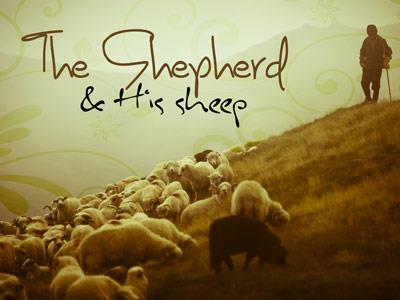-
I Am The Good Shepherd Series
Contributed by James Jackson on Mar 11, 2024 (message contributor)
Summary: #5 in "What's in a Name: The I AM Statements of Jesus"
What’s In a Name?
Week 6: I Am the Good Shepherd
Have you ever thought about the fact that church is the only place you hear someone described as a sheep like it’s a good thing? Outside the pages of Scripture, no one describes being sheeplike as anything desirable, You’ve never heard of a sports team being called “the sheep.” You’ve never heard of a gangster called Tony the Lamb.
Vineyard, what kind of truck do you drive? Would you have bought it if it was the “Dodge Sheep?” Come to think of it that may be why Yugo went out of business. No one wanted to drive a car named after a female sheep.
No one wants to be described as a sheep. If you look up “sheep” as it refers to human beings you get a person who is meek, stupid, timid, submissive, unimaginative, easily led, without initiative. docile, compliant, or easily influenced.
In 2017, Webster’s dictionary officially added “sheeple” to the dictionary. Sheeple is a mashup of “Sheep” and “people.” The word was used for people who uncritically took everything the media or the government or politicians told them at face value. It hit its peak during Covid when it started being applied to people who followed the mask mandate or practiced social distancing.
So it is interesting that most of us would never want to be known as a sheep. And yet, Psalm 23:1 is the 8th most searched for Scripture passage on Google, and the most popular funeral passage. You know it, don’t you: “The Lord is my … [audience].”
So if the Lord is your shepherd, what does that make you? [sheep]
But that’s weird. That’s counter-cultural. Most people today, especially those who don’t have any Biblical frame of reference, would hear us talking about being the sheep of God’s pasture and go—why would anyone want to be a sheep? Stupid, timid, submissive, unimaginative, docile, compliant, helpless, weak, easily influenced. That’s not me. I’m the captain of my fate. I’m the master of my soul.
But here is the big idea for this sermon. And if you get this—if you really understand it, then you can leave now. If you really live like you get this main idea, you can go ahead on to Huey Magoo’s or Olive Garden or wherever you go for Sunday lunch, because this is all I’m going to talk about. Are you ready? Here is the big idea:
If you have a good shepherd, it’s okay to be a sheep.
Jesus is the Good Shepherd
And so this morning, we are going to study Jesus’ 4th I Am statement: I am the Good Shepherd. We are in John 10. We read verses 1-10 last week, so this morning we are going to zero in on verses 11-18.
11 I am the good shepherd. The good shepherd lays down his life for the sheep. 12 He who is a hired hand and not a shepherd, who does not own the sheep, sees the wolf coming and leaves the sheep and flees, and the wolf snatches them and scatters them. 13 He flees because he is a hired hand and cares nothing for the sheep. 14 I am the good shepherd. I know my own and my own know me, 15 just as the Father knows me and I know the Father; and I lay down my life for the sheep. 16 And I have other sheep that are not of this fold. I must bring them also, and they will listen to my voice. So there will be one flock, one shepherd. 17 For this reason the Father loves me, because I lay down my life that I may take it up again. 18 No one takes it from me, but I lay it down of my own accord. I have authority to lay it down, and I have authority to take it up again. This charge I have received from my Father.”
May God bless the reading of his word. Let’s pray [pray]
Background:
I want to make a really profound, deep, theological observation as we dive into this morning, and you don’t want to miss this or forget it, so write this down. I noticed in my studies this week that Chapter 10 comes right after chapter 9.
And in chapter 9, just to recap for those of you that maybe weren’t here last week, Jesus healed a man who had been born blind. Now this was significant, because the Old Testament prophet Isaiah prophesied that the Messiah would open the eyes of the blind (42:7), and we have talked about how there is no record anywhere in the Old Testament of anyone opening the eyes of the blind. So the Pharisees and teachers of the law are grilling this guy to try to figure out who Jesus is. Because, see, He had done this miracle on the Sabbath. And so the Pharisees are having some cognitive dissonance between two opposing ideas: First, Jesus has to be from God, because no one else could heal a man born blind, but second, Jesus can’t be from God because no one coming from God would break the sabbath. So they don’t know what to do with Jesus. He’s breaking their rules. But he’s doing things that only someone who came from God could do.

 Sermon Central
Sermon Central



